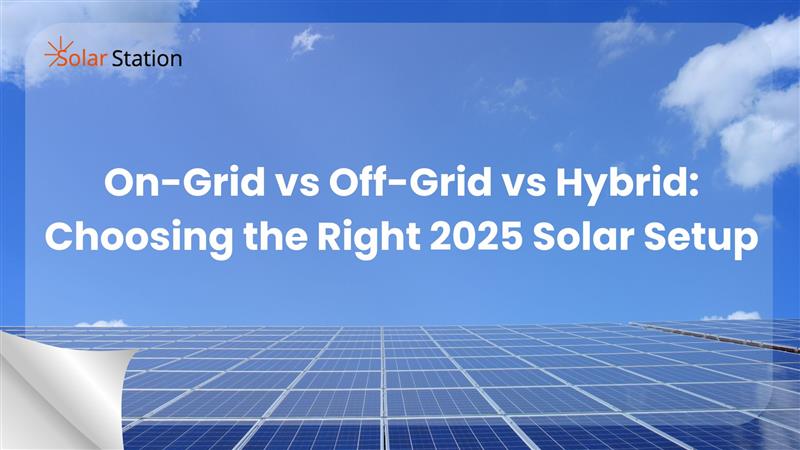
On-Grid vs Off-Grid vs Hybrid: Choosing the Right 2025 Solar Setup
Date:-2025-07-15Introduction: Making Smarter Solar Choices in 2025
As the world is rapidly moving towards clean energy sources, solar power has evolved into more than a green alternative. It's an excellent long-term investment. In 2025, solar power isn't just about installing panels; it's also about selecting the most suitable solar system to meet your energy requirements.
Do you want to opt for an on-grid solution to lower your bills or opt for an off-grid system for total independence, or the hybrid option to get two of the most efficient?
In this blog, we'll break down the differences between the three most common solar configurations--On-Grid, Off-Grid, and Hybrid--so you can make an informed decision tailored to your lifestyle, location, and future energy goals.
1. On-Grid Solar System: The Urban Saver
A grid-connected device can be connected to the electricity grid. During the sun's rays your solar panels produce energy to power your business or home. If you generate more power than you consume, the surplus returns into the grid, earning credits via net meters.
Key Features:
- No battery required
- Simple and economical
- Ideal for areas with a reliable grid supply
Pros:
- Lower cost at first
- Net metering and government subsidies benefits
- Low maintenance
Cons:
- Power is not available during blackouts.
- Dependent on grid availability
Best For:
Commercial and urban homeowners are looking to reduce electricity bills without worrying about backups in the event of interruptions.
2. Off-Grid Solar System: The Self-Sufficient Choice
An off-grid System is unconnected to the grid that utilities use. It utilizes battery storage to hold solar energy to use in the evening or on dark days. This is crucial in rural or remote areas where the grid might be unstable or not available.
Key Features:
- Fully self-contained
- Storage of batteries is essential.
- Energy autonomy
Pros:
- Completely independent of the power companies
- Work in remote areas with no access to the grid
- Reliable in times of blackouts and emergencies
Cons:
- More expensive setup costs due to batteries
- Needs careful management of energy
- Maintenance of batteries is required
Best For:
Hill stations, farmhouses, forest lodges, and rural homes that are off-grid in where power supply is not always reliable or consistent.
3. Hybrid Solar System: The Smart All-Rounder
A hybrid system of solar blends the advantages of both grid-connected and off-grid models. It connects to the grid, but it also comes with an emergency battery backup that provides uninterrupted power during power outages. These systems manage solar energy production, batteries, battery storage, and grid power based on the current demands.
Key Features:
- Connected to the grid, battery Backup
- Intelligent smart inverters that are advanced
- High flexibility and reliability
Pros:
- Uninterrupted power supply
- Net Metering is eligible for
- Monitoring of smart energy usage and monitoring
Cons:
- The costs of upfront are higher
- More complex installation
Best For:
Businesses and homes in semi-urban areas, where power outages are frequent but grid connectivity is available.
Top Solar Tech Trends You Should Know in 2025
1. AI-Driven Solar Inverters
Modern hybrid inverters are now equipped with artificial intelligence as well as remote diagnostic capabilities. They track patterns of energy consumption, suggest improvements, and can seamlessly switch between battery, solar, and grid.
2. Next-Gen Battery Storage
Lithium iron phosphate (LiFePO4) batteries will dominate the market by 2025 due to their 10-plus years of life and more safety, and higher charging efficiency. Also, the batteries are 30-40% less expensive than they were five years ago.
3. Solar-Powered EV Charging
Due to the increasing popularity the use of electric motors, hybrids now typically include EV-ready ports permitting users the ability to charge their car directly by solar energy--reducing the cost of fuel to a minimum.
4. Sleeker, Space-Saving Panels
Solar panels today are smaller, more efficient, and designed to blend seamlessly with contemporary roofs. They are ideal for homes where design is as important as efficiency.
How SolarStation Helps You Make the Right Choice
We are at SolarStation.in We not only install solar panels, but we also aid you in creating the ideal energy plan for your future. SolarStation team of specialists provides all-inclusive advice from conception to installation and beyond.
Here's what we can do to help:
- A Custom Solar Consultation. We evaluate your energy usage, the size of your roof, your finances, as well as backup requirements
- optimized system design. We match you to your most effective solar configuration
- Certification for Installation. Our technicians ensure fast, secure, and reliable installations
- Post-Sale Service & AMC: Continual check-ups of the system, regular maintenance, and technical assistance
- Subsidy and Financing Assistance: We assist you in getting government-funded subsidies and EMI options
If you require a simple grid system or a hybrid system that includes batteries and EVs, we make solar easy, affordable, and future-proof.
Conclusion:
The decision between On-Grid, Off-Grid, and Hybrid isn't only about technology. It's about the way you live your life in the present, where you are, and what you value.
- Take a trip on-grid for a simple and cost-effective solution in safe power zones
- Pick Off-Grid to enjoy complete autonomy in rural or remote locations.
- Consider a hybrid. If you are looking for flexibility and security as well as smarter energy management
In 2025, the solar energy industry isn't only about cutting electricity costs; it's about achieving energy independence, establishing sustainable communities, and making preparations for a sustainable, carbon-free world. We at SolarStation believe that the sun belongs to all.
-
-
-
-
-
-

